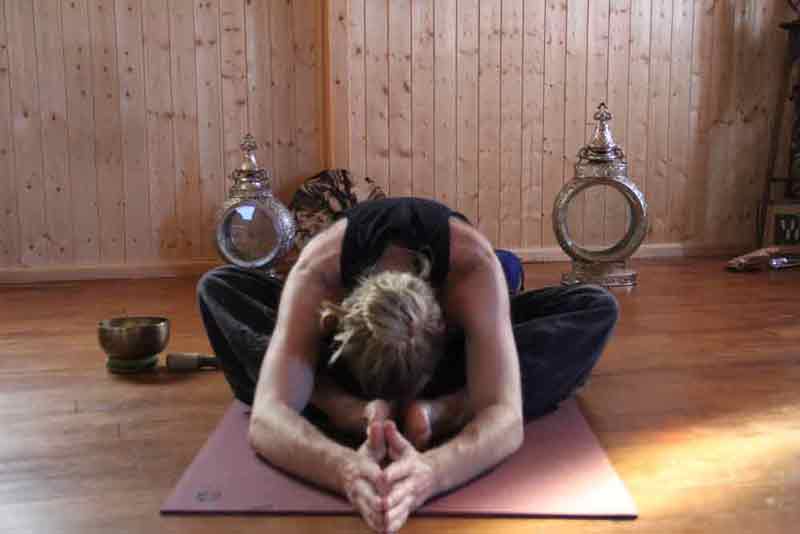The yoga scene in the UK has been evolving rapidly over the past few years. While dynamic styles like Vinyasa and Ashtanga once dominated studio schedules, there’s been a noticeable shift toward slower, more meditative practices. Yin yoga, in particular, has captured the attention of both practitioners and teachers across Britain. Interestingly, many UK yoga instructors are packing their bags and heading to Bali for their Yin yoga certification.
The Rise of Yin Yoga in the UK
Before diving into the Bali connection, let’s talk about why Yin yoga has become so popular in Britain to begin with. Our fast-paced, technology-driven lifestyles have left many of us constantly overstimulated and disconnected from our bodies. The typical Brit spends hours hunched over computers or scrolling through phones, barely moving except to make another cup of tea. (Speaking of which, I should probably put the kettle on before continuing this post…)
Yin yoga, with its long-held passive poses and emphasis on connective tissue release, offers the perfect antidote to this modern condition. It’s like medicine for our stressed-out, tight-bodied society. Students leave classes feeling both relaxed and revitalized—something that’s increasingly rare in our busy lives.
UK yoga teachers are noticing this shift in what their students need. The demand for Yin classes has skyrocketed, especially in urban centers like London, Manchester, and Edinburgh. This has naturally led to more teachers seeking specialized training in this style. I mean, we’re talking waitlists for Yin classes in some studios! Who would’ve thought that lying around on bolsters would become more popular than fancy arm balances?
Why Bali Has Become the Yin Training Hub
So, why are these UK teachers boarding planes to Bali for their Yin Yoga certification instead of training closer to home? After talking with dozens of colleagues who’ve made this journey—and yes, I’ve become a bit obsessed with asking everyone about their training experiences at every yoga gathering I attend—several compelling reasons emerge.
First off, Bali offers an immersive training environment that’s hard to replicate in Britain. Most yoga teacher training programs in Bali happen in retreat-style settings, allowing participants to fully disconnect from their regular lives and dive deep into the practice. Try achieving that level of immersion when you’re still answering work emails and running errands between training sessions! Not to mention dealing with the British weather… hard to feel zen when you’re soaked from the rain on your way to class.
The tropical setting helps too. Yin yoga is all about surrendering, releasing tension, and moving into a parasympathetic nervous system state. That’s simply easier to achieve when you’re surrounded by lush jungles, pristine beaches, and warm weather year-round. The natural environment of Bali seems to mirror the very qualities that Yin yoga aims to cultivate.
Many UK teachers also mention the quality and diversity of instructors offering Yin training in Bali. The island has attracted some of the world’s leading Yin yoga teachers, including those trained directly under the pioneers of the practice, like Paul Grilley and Sarah Powers. These experienced teachers bring not just technical knowledge but also deep connections to the philosophical and energetic aspects of Yin.
The East-West Fusion Factor
Another factor drawing UK teachers to Bali for their Yin Yoga certification is the unique fusion of Eastern and Western approaches to wellness that the island embodies.
Yin yoga itself represents this fusion—it’s rooted in Taoist principles and Chinese meridian theory but presented in a format accessible to Western practitioners. Bali, with its blend of traditional Balinese healing practices, Hindu spirituality, and Western yoga influences, provides the perfect backdrop for understanding this East-West dialogue.
Many training programs in Bali incorporate elements of Traditional Chinese Medicine, meridian theory, and even Balinese healing traditions alongside the physical practice of Yin yoga. This holistic approach gives UK teachers a much richer foundation than they might receive in a purely Western setting.
The Economic Reality
Let’s be honest—money matters too. While flying halfway around the world might seem extravagant, the math often works out favorably for UK teachers heading to Bali for yoga teacher training.
A comprehensive 100-hour Yin yoga certification in London might cost upwards of £1,500, and that’s just for the training itself. Add accommodation and food (because you still need somewhere to sleep and something to eat), and you’re looking at a significant investment.
Meanwhile, many Bali-based Yin yoga teacher trainings include accommodation and meals in their packages, with total costs often comparable to UK prices—but for a much more immersive experience. When you factor in the lower cost of living in Bali, many teachers find they can stay longer, deepening their practice beyond the formal training period without breaking the bank.
Though I should probably mention, as one of my friends learned the hard way, that those “amazing deals” sometimes come with unexpected surprises like roosters crowing at 4 am or shared bathrooms that are… let’s just say “rustic.” You definitely want to read the reviews before booking!
The Community Connection
The social aspect shouldn’t be underestimated either. Training in Bali connects UK teachers to a global community of yoga practitioners. These international connections prove invaluable when teachers return home, offering fresh perspectives and potential collaboration opportunities.
Many UK yoga teachers report that the friendships formed during their Bali training become a crucial support network as they begin teaching Yin. They share resources, class plans, and marketing strategies across continents, enriching their teaching and business practices.
Bringing Bali Back to Britain
What happens when these Bali-trained teachers return to the UK? From what I’ve observed, they bring back more than just technical skills. There’s a certain quality to their teaching, i.e., an authenticity and depth that’s palpable.
Students seem to notice the difference too. Classes taught by Bali-trained Yin teachers often have waitlists, with students drawn to the unique blend of technical knowledge, philosophical depth, and genuine presence these teachers embody.
Many returnees also incorporate subtle elements of Balinese culture into their teaching spaces—perhaps a small offering at the front of the room, the scent of incense, or the gentle sounds of gamelan music. These sensory touches transport students, if only briefly, to the serene environment where their teachers trained.
Though I did attend one class where the teacher went a bit overboard with the incense—I could barely see the person on the mat next to me through the haze! Moderation is key when bringing Bali to Birmingham, folks.
Is It Worth the Journey?
If you’re a UK yoga teacher considering Yin certification, you might be wondering if the long journey to Bali is truly worth it. Based on conversations with those who’ve done it, the answer seems to be a resounding yes.
Combining immersive learning, expert instruction, cultural context, and natural beauty creates a transformational experience that goes far beyond what’s possible in a weekend course at your local studio.
Plus, there’s something powerful about stepping away from familiar surroundings to learn something new. The distance provides perspective, making it easier to shed old habits and embrace new ways of thinking about yoga, teaching, and yourself.
So if you’ve been feeling the call to deepen your understanding of Yin yoga, perhaps it’s time to look beyond the Thames to the warm waters of the Bali Sea. Your teaching and your students will thank you for it. And hey, if nothing else, you’ll have some great stories about when you found a gecko in your yoga bolster!





























